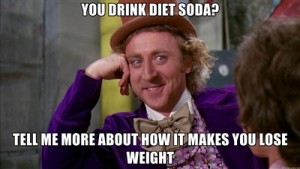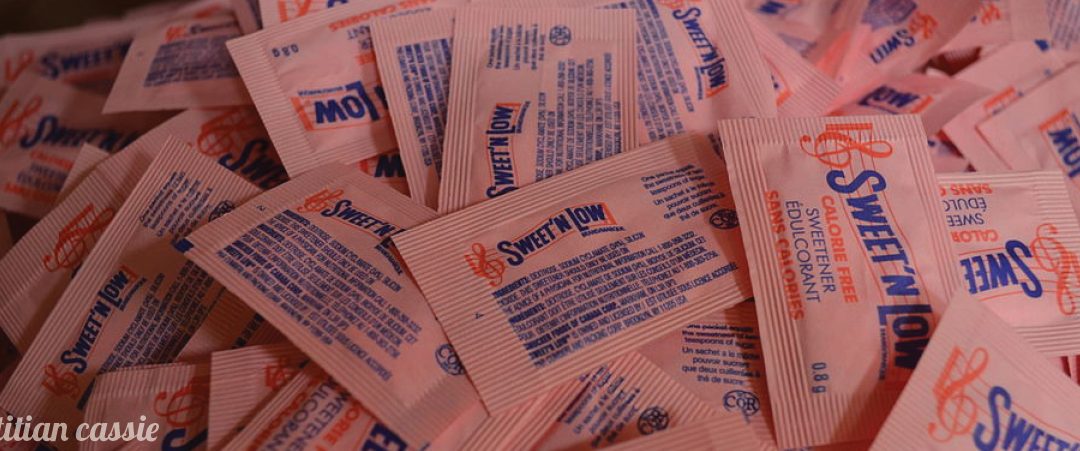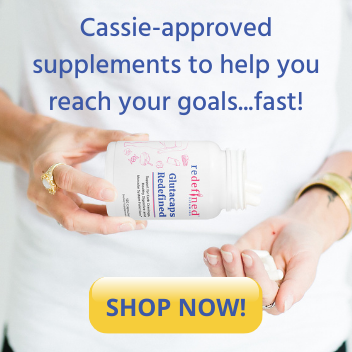There are two widely accepted reasons that Splenda and the ever expanding list of sugar substitutes (also known as artificial sweeteners) have become so successful (marketing and commercial-wise, NOT successful in making us healthy) in our collective diet.
1. First and foremost, because they contain no calories.
2. Secondly, they’re commonly recommended for diabetics due to the thought that they don’t raise blood sugar levels—which isn’t true. (More on this below!)
I used to use them too, thinking they were the lesser of two evils when compared to sugar, since it’s what I was taught in school when I was studying to be a dietitian. If dietitians use and recommend them, it’s no wonder we believe they’re good for us, right!?
Well, as the research repeatedly shows, there might not be any good reasons to support the notion that artificial sweeteners are beneficial for us (and why would we want to put anything artificial into our bodies? Yuck!). Even worse, they’re far from being healthy and guilt free as they’ve been touted by manufacturing companies and TV commercials.
In this post, I’m lumping all artificial sweeteners in the same category. Saccharin, sucralose (trade name: Splenda), aspartame—they’re all artificial and they all have negative consequences associated with their consumption.
7 Reasons why you should throw away all your pink, yellow and blue packets:
1) They mess up your metabolism. If you clicked the post I referenced above about why I hate calories, you might understand why it’s dangerous to take this on as a positive trait for artificial sweeteners. While artificial sweeteners are “calorie free,” these phony substances actually confuse your metabolism which in turn leads to weight gain—exactly the opposite effect you’re going for when forgoing the calories you get from real sugar.
2) They may exacerbate diabetes, not prevent it. According to this study, artificial sweeteners can actually raise your blood sugar. (One good reason why it’s ludicrous that artificial sweeteners are still recommended for those with diabetes.)
3) They’re dangerous. Artificial sweetener consumption is continually associated with type 2 diabetes and metabolic syndrome (a term used to refer to a group of risk factors that occur together and increase the risk for coronary artery disease, stroke, and type 2 diabetes—not good). When the uber conservative American Diabetes Association is publishing this research, we should be extra concerned.
 4) They backfire. A huge reason why hopeful dieters became best buddies with this white stuff was because of its (empty) promise to fulfill their fantasy of all the sweet without any of the calories, allowing them to have their cake and eat it too (so to speak) while the pounds melt away.… Of course, now we know that it’s not just a matter of calories in and calories out. Our bodies are so much smarter than that, and weight loss is multifactorial, taking into account hormonal balance and blood sugar stabilization, sleep and stress. Instead of depriving ourselves of calories and nutrition, we need to stay fueled to shed pounds.
4) They backfire. A huge reason why hopeful dieters became best buddies with this white stuff was because of its (empty) promise to fulfill their fantasy of all the sweet without any of the calories, allowing them to have their cake and eat it too (so to speak) while the pounds melt away.… Of course, now we know that it’s not just a matter of calories in and calories out. Our bodies are so much smarter than that, and weight loss is multifactorial, taking into account hormonal balance and blood sugar stabilization, sleep and stress. Instead of depriving ourselves of calories and nutrition, we need to stay fueled to shed pounds.
5) They fuel our sugar addiction. We are learning more and more about the addictive nature of sugar. Several studies have shown that sugar dependence is similar to drug addiction, so artificial sweeteners used as a replacement for sugar might make us eat more sugar anyway. Some studies suggest these sweeteners increase our appetite and desire for sweetness since they can trigger the same reward center in the brain that sugar does.…except your body never actually gets the sugar, so it’s never satisfied.
6) They’re GROSS. Splenda contains chlorine. Three chlorine molecules to be exact. I can hardly stand swimming in a pool with chlorine for very long because that smell makes me gag, not to mention how it makes my eyes burn. I certainly don’t want to be ingesting it directly into my body on purpose. Let’s remember that keyword “artificial” here…! It also grosses me out that they’re found in all sorts of things you wouldn’t suspect, from protein bars to chewing gum, cough drops and even vitamins. Gross. (Non-artificially sweetened vitamins available here.)
7) They wreak havoc on your gut. The evidence on the importance of gut health is overwhelming. If there’s one thing I love to talk about the most, it’s probably gut health. We know how important gut heath is for immunity, metabolism, weight loss, digestion, etc. (Read Heal the Gut No Matter What and Digging Deeper into Gut Health if you’re not familiar). Artificial sweeteners negatively impact our gut health by killing the good bacteria. Virtually all of us should be working on healing our guts, so the last thing we want to do is consume something that’s further impairing our gut health!
In summary, artificial sweeteners don’t even deliver on any of their intended promises. They contribute to weight gain, even if they’re calorie free. They raise our blood sugars instead of lowering them. They worsen our gut health. They can contribute to making us eat more sugar. What’s the point? Why play tricks on your body when they end up backfiring?
So, what’s a health nut to do? Implement these 6 steps:
1) Replace your yellow (or pink or blue) packets with plain ol’ sugar or stevia. Stevia is a natural sweetener that comes from a plant, not a lab—and it’s 30 times sweeter than sugar so you don’t have to use much (just be sure it’s not Truvia—a false-advertising job well-executed. A scam!) For the record, I still wouldn’t consider stevia a free pass to the all-you-want-to-use buffet, since it could still increase our desire for sweetness. That said, it has been around long enough for us to know it’s a safe alternative to sugar.
2) Choose real food. Why do we “need” these sweeteners anyway? Could it be because we are abnormally addicted to sugar? Do your best to keep the focus on real food, and if you find that to be nearly impossible due to your sugar cravings, be sure to also implement my next tips!
3) Supplement with Glutacaps Redefined. Kick those sugar cravings by supporting your biochemistry! L-Glutamine is a precursor for important neurotransmitters that determine whether or not you have sugar cravings. If you’re low in these brain chemicals, then you’re going to get a much greater high from carbohydrates and sugar. Take this amino acid to reduce your cravings so you have more control.
4) Eat more fat. Fat keeps you full while also supporting metabolism, brain function and (gasp!) weight maintenance and loss by way of keeping you off the blood sugar roller coaster. If your blood sugars are low (ever felt hangry?) then you’re going to crave sugar. End of story. You need healthy fat to help keep your blood sugar levels balanced so you stay satisfied and full.
5) Unbrainwash yourself. Educate yourself with evidence-based nutrition information and break free of the lies you’ve been told. It’s not too late, and your body will thank you!
6) Get my BEST tips for preventing and BUSTING sugar cravings by clicking the pink button below!











